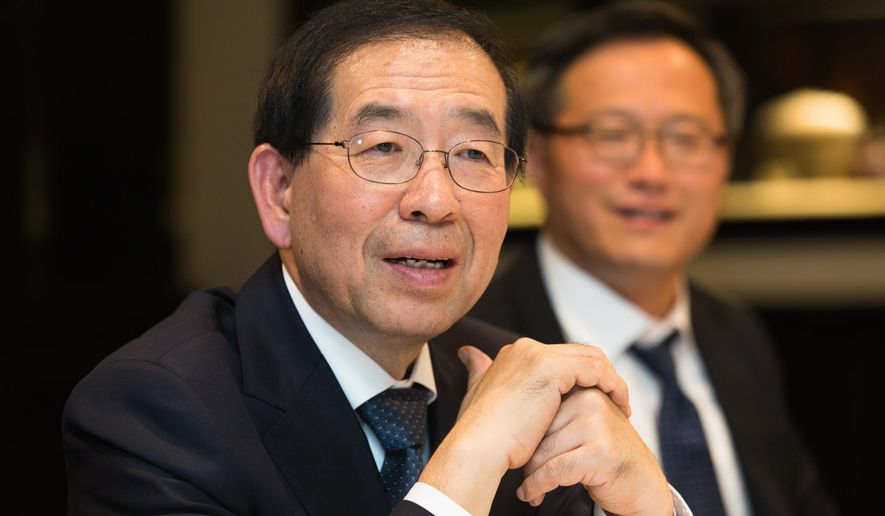Seoul Mayor Park Won-soon, whom polls suggest will someday become South Korea’s president, says the Obama administration has been too passive in dealing with North Korea, leaving the region without a clear strategy for steering the pariah nation away from making nuclear weapons.
“I believe that maybe the U.S. can take a more proactive stance and help the North walk down the path of peace, walk down the path of openness,” says Mr. Park, an outspoken human rights lawyer serving his second term as mayor of the South Korean capital.
“We need some kind of strategy to help them get rid of their nuclear weapons,” he says. “Currently we don’t really have any leverage against the North to have them come down the path of denuclearization.”
In a wide-ranging interview with The Washington Times, Mr. Park also spoke of a future South Korea with closer economic ties to China — the global power that many in Washington, including within the Obama administration, perceive to hold great influence over North Korea.
But Mr. Park said South Korea’s growing ties with China should not be seen as jeopardizing Seoul’s “robust” and “sealed in blood” diplomatic alliance to the U.S.
And he took care not to accuse Washington of yielding too willingly to Beijing’s leadership on Pyongyang. Instead, Mr. Park said the Obama administration has pursued a “strategic patience” that has been “helpful to the Korean Peninsula” while also “enabling the North.”
SEE ALSO: U.S. man caught swimming to North Korea ‘trying to meet’ Kim Jong-un
His nuanced remarks underscored the mystique and rhetorical skill behind Mr. Park’s rise in popularity in South Korea.
In 2012 he began identifying himself with the nation’s Democratic United Party. But his past as a liberal human rights lawyer, along with his initial rise as a ride-above-the-fray independent, captured international headlines in 2011 when he first won the Seoul mayorship.
He has since captivated South Koreans by trying to unify the nation’s bitterly divided political scene.
His fame also resides in his desire to be seen as a modern international mayor, eager to engage in city-to-city diplomacy rather than be held back by slow-moving national politics or global institutions.
In that vein, Mr. Park is an urban environmentalist scanning the planet for relationships that could help Seoul improve its transformation to a “green city” in Asia. He has worked to cut air pollution in Seoul, pushing aggressive “solarization” policies as well as replacing the city’s fleet of diesel buses with ones that run on natural gas.
His pass through Washington this week coincided with the Climate Change Summit at the U.N. General Assembly in New York. It also came just after Mr. Park learned that Seoul had been selected the winner of the “2014 C40 & Siemens City Climate Leadership Award” for pursing green energy initiatives.
SEE ALSO: U.S. seizes $500K in assets from former South Korean president
The recognition, said Mr. Park, stems from a policy he began pushing three years ago to direct Seoul toward delivering an entire nuclear power plant’s worth of electricity from solar and other renewable sources.
He says the policy is not only working but is burnishing Seoul’s image as an environmental game changer at a time when many Asian capitals, such as Beijing and Jakarta, are struggling to emerge from beneath blankets of smog that have coincided with their economic rise over the past 30 years.
His popularity was so high upon being re-elected in June that a Korea Times poll pointed to him as the candidate most favored to replace the nation’s first female president, Park Geun-Hye, when her single five-year term ends in 2018.
With a potential presidential campaign years away, Mr. Park remained coy about his chances during his interview with The Times.
He was, however, willing to weigh in on two of the most pressing issues shaping Korean politics — specifically whether the North and the South should ever reunify, and whether South Korea should pursue nuclear weapons.
“Our people do hope for reunification in the near future,” Mr. Park said, acknowledging that socioeconomic differences between North and South have become vast over the years.
“We have been divided for 70 years,” he said. “We are becoming increasingly more different as the days go by, so we have to take a realistic approach.”
Reunification should be “an eventual process” with cooperation and trust accumulating slowly,” he added, citing the 1989 reunification of East and West Germany as a potential model for the Koreas.
With regard to nuclear weapons, Mr. Park pushed back against the notion that South Korea should develop its own weapons to counter the North’s nuclear activities, asserting that he backs “the stance that the Korean Peninsula should go de-nuclear.”
Those comments fit his reputation for aligning with Japan’s recent environmental push following the 2011 tsunami and nuclear disaster in that nation.
Mr. Park said he believes South Korea eventually could abandon the use of nuclear energy altogether.
• Guy Taylor can be reached at gtaylor@washingtontimes.com.




Please read our comment policy before commenting.